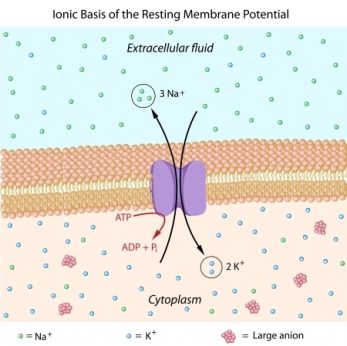Potassium is one of the main electrolytes and absolutely essential for the body. Potassium has critical functions for human metabolism and physiology and it is important for the body to maintain optimal serum levels.
Potassium is the main pH buffer within the cell and works in symphony with the other electrolytes including sodium, chloride, magnesium, calcium and phosphate.
Potassium concentration is greatly influenced by adrenal hormones and can, therefore, be a marker for adrenal insufficiency.
Functions of potassium:
- Nerve conduction
- Maintenance of healthy blood pressure levels
- Muscle function
- Cellular transport via the sodium-potassium pump
- Acid-base balance
Potassium, along with sodium, plays an important role in the kidney’s regulation of pH. Potassium bicarbonate is the major intracellular inorganic buffer and when the body is deficient in potassium, the cell becomes acidic. In order to bring the body back into pH balance, the body responds by increasing the respiration rate and depth of breathing, which increases carbon dioxide excretion and increases in pH.
Potassium excretion is controlled mainly by the kidney. 80-90% of cellular potassium is excreted by the kidney in the urine, the remainder is excreted in the sweat and stool.
The kidney does not conserve potassium and will continue to excrete potassium, even if potassium is not consumed in adequate amounts. Therefore, a potassium deficiency can occur if adequate amounts of potassium are not consumed on a daily basis.

Because potassium is the main cation found inside of the cell, there will be an increase in potassium in the blood serum in the case of cellular damage.

Aldosterone is the main adrenal hormone regulator for potassium levels in the body and causes an increased excretion of potassium from the urine. Potassium levels in the blood can, therefore, be a marker for adrenal dysfunction.
Common indications for potassium need:
- Muscle Weakness
- Fatigue
- Mental confusion
- Heart disturbances
- Problems in nerve conduction
Serum potassium is a marker for adrenal health and acid-base balance and should be checked if you think your potassium intake is insufficient and if you experience any of the symptoms above.
The optimal range of potassium is 4 – 4.5 mmol/L. While a high serum potassium level (>4.5) may be indicative of adrenal insufficiency, a low level (< 4) may indicate adrenal stress.
Adrenal Fatigue/Adrenal Insufficiency
Adrenal Fatigue, also called adrenal insufficiency or adrenal hypofunction, causes a decrease in the secretions of both the glucocorticoids (especially cortisol) and mineralocorticoids (especially aldosterone). A decrease in aldosterone from adrenal insufficiency will cause a decrease in the amount of potassium excretion by the kidneys. This will lead to an increase in serum potassium.
If the potassium level is increased (> 4.5) along with a normal or decreased sodium level (< 135) and/or chloride (< 100), it may be a possible indicator for adrenal insufficiency. The sodium: potassium ratio will also be decreased.
Additional markers that may be out of balance with adrenal insufficiency include decreased aldosterone and cortisol levels.
Adrenal Stress
Adrenal stress causes an increase in the secretions of both the glucocorticoid and mineralocorticoid hormones. When aldosterone, the major mineralocorticoid, is increased from adrenal hyperfunction, it will lead to an increased amount of potassium excretion, which in turn causes decreased serum potassium levels.
If the potassium level is decreased (<4) along with a normal or increased sodium level (>142) and/or chloride (>106) it may be a possible indicator for adrenal stress. The sodium: potassium ratio will also be increased. Aldosterone and cortisol levels may be out of balance as well.
Adrenal fatigue or adrenal stress can be confirmed by salivary cortisol tests, such as the DUTCH Hormone Analysis.
If you want to read more about adrenal stress and potential causes and signs, click here.
If you think you have adrenal insufficiency and want to read more about the causes and signs, click here.
Interested in getting symptom-relief and finding out what works for you?
Contact me if you need help finding and addressing your root causes, and getting your health back. I will help create your individual nutrition and lifestyle protocol to achieve long-lasting vitality and well-being.

Leave a comment